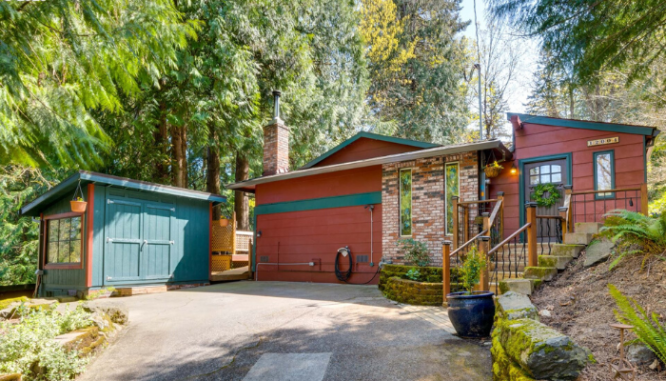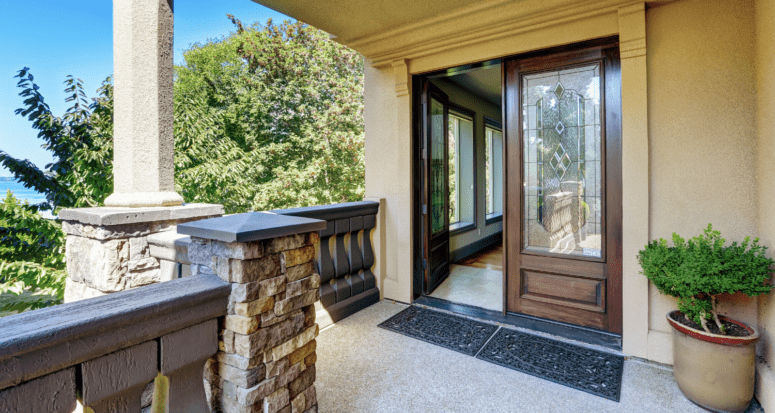‘I Sold a House During Coronavirus:’ How 3 Real-Life Deals Came Together
- Published on
- 3-4 min read
-
 Valerie Kalfrin Contributing AuthorClose
Valerie Kalfrin Contributing AuthorClose Valerie Kalfrin Contributing Author
Valerie Kalfrin Contributing AuthorValerie Kalfrin is a multiple award-winning journalist, film and fiction fan, and creative storyteller with a knack for detailed, engaging stories.
Sometimes you can weigh whether to sell your home or wait it out. But all too often, life intervenes, forcing a change of plans — even during a pandemic. While real estate agents estimate that 37% of people who planned to sell their homes in the spring have hit pause, at least temporarily, others couldn’t afford to wait. These sellers were stressed at first, but all can now rest easy, having happily sold their homes.
Thanks to agents, technology, and even helpful neighbors, they managed to market and show their properties among social distancing and health concerns, as well as clear hurdles in the closing process. Here’s how. (Please note: For privacy reasons, all sellers asked that their last names not be used.)

Moving for a job in Colorado
Sonya and her husband, John, loved the 1,200-square-foot two-bedroom home with hardwood floors and stone-slab counters that they’d bought in Portland, Oregon, in August 2019. Then John, an architectural drafter in the construction industry, was offered a job in April that was too good to decline. It started in Colorado Springs. They had roughly a week.
“People who are headhunting want you right away,” Sonya says. “I knew we weren’t going to have an open house and a ton of people walking through. I was more worried about people being furloughed. … Who is able to buy a house right now?”
Partnering with a top agent
The couple turned to Bonnie Roseman, a veteran top-selling Portland agent who had sold them the house. She arrived wearing a mask and gloves and did a quick walk-through where she pointed out furniture to pare down and rearrange. “We kept it minor because they were in such a hurry,” Roseman says.
She asked the couple and their dogs to leave while a professional photographer shot photos, video, and a 3-D Matterport image of the layout. The house, offered at $379,000, went on the market on a Friday with two showings on a Saturday. A buyer at one of those wrote an offer right away with a substantial down payment.
“They were more worried about when we could get out of here,” Sonya says.
The buyers had to be pre-approved and confirm that they’d viewed the listing’s visuals. Roseman says she has an advisory she provides where each person certifies to the best of their knowledge that they haven’t been exposed to the virus. She also has a coronavirus addendum that extends deadlines in purchasing agreements.
She allowed only two people in the house at a time and set up a hand-washing station with separate soap, paper towels, and a small garbage can. The agent says only she opened and closed cabinets and doors, using gloved hands. It’s not possible to sanitize and clean after every visit, she says, so she wanted to minimize access.
Going through the selling motions
The house underwent a home inspection, a radon inspection, and visits from a chimney mason and an arborist. It needed no significant repairs; the couple had replaced the electrical panel soon after their original purchase.
Some listings that were on the market as the virus became more prevalent are struggling, Roseman says, but “everything new on the market is getting snapped up.” She’s hosted livestream showings through Facebook, used lock boxes for inspectors to access property, whatever accommodates people’s comfort levels.
Driving around with the dogs
Coordinating with everyone so that they could vacate the house as needed wasn’t as much of a challenge as finding somewhere to go with their dogs during those times, the couple says. They wound up placing the dog beds and kennels in their truck and driving around for hours.
“Everywhere was closed. We couldn’t go to the state park, couldn’t go anywhere,” John says. He recommended that sellers take a laptop or other work with them that they can do while waiting.
Next steps
The couple has an RV and plans to stay in an RV park in Colorado Springs until they find another home they’d like to buy. Although they were impressed by how the 3-D images and video helped showcase their property, they agreed that they’d still want to view a future home in person before purchasing.
“I would do as many drive-bys as possible and check out the neighborhood,” John says.
“There’s no way I would buy a house without stepping in it and seeing it,” Sonya says.

A family with growing needs
For Rebecca, a mother of three children in the Tampa, Florida, area, a mailer from Keller Williams Realty offering to sell houses arrived at what seemed to be the right time. She and her husband, a law enforcement officer, had just discussed how the layout of their three-bedroom house adjacent to a lake no longer suited the special needs of their youngest child. The home also is about an hour away from their son’s therapy appointments. (The couple has two older children, ages 12 and 14.)
Using virtual showings to screen for buyers
Top real estate agent Cheesette Cowan, who specializes in luxury properties and relocations, listed the property, which includes a pool and room for a camper, as both available for purchase and for rent-to-purchase. Then Hillsborough County in late March asked residents to shelter in place, and she switched to purchases only.
Like Roseman and other agents, Cowan set up virtual showings first to screen buyers. “You don’t want to put people out when there’s no real interest there,” she says.
Taking extra showing precautions
Her realty team also provided an advisory through the multiple listing service (MLS) that essentially stated all parties assume any risks of showing property at this time. “I have had two sellers take their houses temporarily off the market because of that,” Cowan says. “I think we have to be OK with that.”
Rebecca says she didn’t like the idea of people she didn’t know coming in and out of her house under the circumstances, but she and her husband also knew it wasn’t feasible to live there for much longer. To help, Cowan arranged for any necessary visits to occur while Rebecca’s son had therapy or during a specific time frame.
Help from some friendly neighbors
Rebecca says she’d leave behind disinfectant wipes with a note, asking visitors to please use them. At first, she and her children took their dog to the dog park across the street when they had to leave the house. But once the park closed, she turned to her neighbors and explained the situation.
“The neighborhood is really friendly,” Rebecca says. “I just told them, ‘Hey, can I hang out in your backyard? They’re showing [my home],’ and they would say yes.”
Success after one cancelled contract
One person made an offer, then lost his job, which cancelled the contract, Cowan says. Fortunately, another buyer came forward with a full-price offer after a virtual showing and an in-person walk-through. “It was very quick,” Cowan says. “They were in and out in less than 15 minutes.” The house also has a backup offer that’s $12,000 above the asking price, she says.
At the time Cowan and Rebecca spoke to HomeLight, closing was six weeks away. “She can e-sign,” Cowan says. “She doesn’t even have to be there.”
Rebecca’s family plans to rent a home closer to their son’s therapy appointments. She advised other homeowners who need to sell under unusual circumstances to be flexible.
“With all of the news articles and everything they tell you, it makes you scared,” she says. “Just be open-minded. If you really want to sell your house, you’ve got to compromise somewhere, at least with how everything is right now.”

An investment in jeopardy
The coronavirus pandemic caused a problem at closing on an investment property for Kimberly, an attorney in Las Vegas, Nevada.
She owned a two-bedroom condo that she leased as extra income and decided to sell earlier this year. Working with Daryl B. Hanna, a top-selling agent with 17 years of experience, she obtained an offer at list price from a buyer moving from another state. She planned to roll the proceeds through a 1031 Exchange into another rental property, a single-family house that she bought for close to $400,000.
“The house is an investment for me to pay for my son’s education. He’s four,” she says.
Everything seemed to be going well; the condo needed only minor repairs. Plus, she’d met the house tenant and liked how he took care of the property.
The virus starts to take its toll
Then COVID-19 became more widespread, along with economic downsizing. On the day that the condo buyer was expected to close, Hanna phoned with upsetting news. The buyer had been furloughed, and when the lender ran another check on his employment, his income was considerably reduced.
“It’s not good enough now during this crisis that you’re employed; you must also be making the same amount of money,” Hanna says. “The documents were signed, walk-throughs performed, the buyer’s funds deposited into escrow, and the lender would not fund the loan.”
This jeopardized Kimberly’s other transaction. “Do I lose my earnest money with the new purchase? There were just so many factors that I had to consider,” she says.
Finding a workaround
Although she wasn’t keen on turning the condo back into a rental, she was sympathetic to the buyer’s situation. “He essentially was homeless. I was looking for hotels so that the buyer could move in somewhere,” she says. “It was the craziest thing.”
Hanna and the buyer’s agent hashed out an idea: Why not tell the buyer’s employer what had happened? Considering the buyer hadn’t been laid off, perhaps the employer could return the buyer to full-time status instead of being furloughed. “Obviously, in a few weeks, he’s going to be back at work,” Hanna says. “Being an employer, I understand you can’t just do things like that no matter how much you want to help. Some just can’t afford to do it. … It was a fifty-fifty [chance].”
A few hours later, Hanna received a call from the buyer’s agent, saying that the employer had done just that. The condo’s closing was delayed for less than a week, but the sale and Kimberly’s purchase ultimately proceeded.
Always a way to make it happen
Kimberly says she was glad to get the property she wanted and was relieved that other aspects of the deal had fallen into place before social distancing. “While I really appreciate the ability to virtually tour a house, I still want to physically go in and see it,” she says. “I like to see how it feels, and you can’t do that remotely.”
For Hanna, the experience is an example of finding a creative solution through good communication.
“On the listing side, you don’t have a lot of control on what happens on the buyer’s side,” he says. “This is where agents and lenders need to keep their cool and work through the issue. … There is always a way to make deals happen.”
Header Image Source: (Artazum / Shutterstock)
